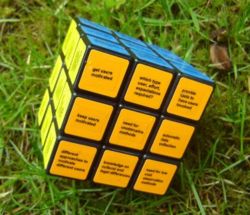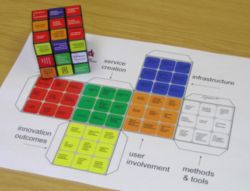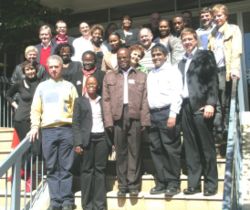Supporting Living Labs in South Africa: Difference between revisions
| Line 88: | Line 88: | ||
**'''ERP Process Modelling for Rural e-Governance - A Living Lab Approach''' by Potjie van der Walt, TshwaneUniversity of Technology, South Africa | **'''ERP Process Modelling for Rural e-Governance - A Living Lab Approach''' by Potjie van der Walt, TshwaneUniversity of Technology, South Africa | ||
**'''Presenting a Knowledge Support Portlet as part of a Collaborative Educational Community Learning Area''' by Bertie Buitendag, TUT, South Africa | **'''Presenting a Knowledge Support Portlet as part of a Collaborative Educational Community Learning Area''' by Bertie Buitendag, TUT, South Africa | ||
===2008-05-12 to 16 Collaboration @ Rural 4th Plenary meeting=== | |||
Revision as of 11:58, 26 May 2008
|

Overview
The lack of a proper understanding what triggers innovations and which innovations prove to be successful in different environmental, social and cultural contexts poses a big threat to the design of real-world innovation. This is in particular true for South Africa. Being a ‘society in transition’ facing the challenge of social change and social innovation South Africa needs to understand how to set advanced African innovation research. Designing real-world innovation in an African advanced way might therefore differ from the indigenous tradition and might not be similar to the western world as well; however, what’s similar is that its start is community-driven.
"Innovation in ICT leading to applications that address development challenges facing South Africa, the Continent and the developing world thereby directly contributing to addressing the challenges faced by the second economy.
Application innovation, through innovation in ICT contribute to and facilitate the research, development and implementation of ICT application that address ‘Digital Divide’ related problems in South Africa and other developing countries. The institute will focus on the pre-competitive space and areas of market neglect with strong emphasis on co-operation with end-users and industry players. A number of application domains have been identified with stakeholders and implementation of R&D and innovation programmes are being prioritized in consultation with stakeholders"
The Focus
Specialists in this group have a joint vision of South Africa as a “competitive and progressive 21st century nation". Through user-driven, open innovation initiatives; bring forth a new mindset of the South African society as equal custodians of the building blocks to all-forms-of- access-&-inclusion.
We are participating in the global economy and want to be recognized internationally for the contribution we will make as co-creators of the Global Knowledge Society.
Living Lab Initiatives in South Africa
- Sekhukhune Living Lab
- Rural Enterprise creation
- Limpopo Living Lab
- Dwesa Living Lab
- Partnership in the Eastern Cape between Universities of Rhodes & Fort Hare, Nokia Siemens Networks, Meraka Institute and COFISA
- Rural connectivity and ICT applications
- Feasibility study-phase in June 2008
- Ndlovu Living Lab
- Partnership between the Ndlovu Medical Centre, INTEL and Meraka
- Telemedicine and rural connectivity
- Soshanguve Living Lab
- Planned by Tshwane University of Technology (ICT Faculty)
- Education, Research, Community Development, Job Creation
- Bushbuck Ridge
- SAP Research and Wits University
- Patient Health System for chronically ill patients in rural areas
Methods and Tools
The Harmonization Cube

Events
2008-04-24 Workshop at Meraka Institute

Venue: Indaba meeting room, Meraka Institute
Living Labs Workshop Programme
Aim: To identify value and innovation outcomes of the separate Living Lab initiatives and to have input for a draft agenda for Living Lab research activities in South Africa.
Attendees: Several stakeholders from:
- academia (e.g., Rhodes University, University of Fort Hare, Tshwane University of Technology, CSIR, Monash University, University of South Africa),
- business (SAP Research)
- governmental institutes (COFISA, HSRC, DST)
Facilitated by: Prof Ingrid Mulder of Rotterdam University
Presentations
- The Soshanguve Living Lab by Dr Jannie Zaaiman, Executive Dean, Faculty of Information and Communication Technology, Tshwane University of Technology
2008-05-07 to 09 IST Africa, Windhoek, Namibia
Day 2: 08 May 2008
- 14h00 Working Session - African Network of Living Labs I (Session Chair: Adam Turowiec, ITTI, Poland)
- Living Lab Methodology, Concept and Development of the European Network of Living Labs by Adam Turowiec, ITTI, Poland
- Networked Micro-Enterprises: The Added Value of Collaborative Procurement in Rural South Africa by Carsten Friedland, SAP Research, Germany
- Open SOA Value Add for Collaborative Services Delivery to Rural SMMEs by Rudi de Louw, SAP Research CEC PTA, South Africa
- 16h00 Working Session - African Network of Living Labs II (Session Chair: Adam Turowiec, ITTI, Poland)
- ERP Process Modelling for Rural e-Governance - A Living Lab Approach by Potjie van der Walt, TshwaneUniversity of Technology, South Africa
- Presenting a Knowledge Support Portlet as part of a Collaborative Educational Community Learning Area by Bertie Buitendag, TUT, South Africa
2008-05-12 to 16 Collaboration @ Rural 4th Plenary meeting
2008-05-17 to 24 COFISA-Finland Living Labs Collaboration Visit
Publications
(Under construction)
Living Labs discussion forum
A Google discussion group called Supporting Living Labs in South Africa has been created as a discussion and interaction platform. Any Living Lab practitioner is welcome to join.
Contact Details
| Contact Person: | Shela Boshomane |
|---|---|
| Tel: | +27(0)12 841 4432 |
| Fax: | +27(0)12 841 4720 |
| Email: | sboshomane[at]csir.co.za |
| Contact Person: | Mario Marais |
|---|---|
| Tel: | +27(0)12 841 3771 |
| Fax: | +27(0)12 841 4720 |
| Email: | mmarais[at]csir.co.za |





